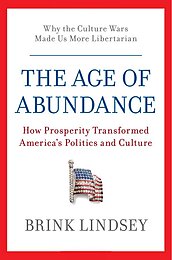“Ever since mass affluence, a phenomenon without precedent in the human story, exploded upon postwar America, social and political theorists have wondered, and worried, about the moral and even the spiritual consequences of material conditions. Putting scarcity behind us has been pleasant, but has it been good for us—meaning good for our souls? It took confidence for Brink Lindsey to venture onto this well-plowed ground with The Age of Abundance. This constantly stimulating book vindicates that confidence. Lindsey is an economic thinker who, like John Maynard Keynes, has a flair for lapidary summations. Lindsey’s measured cheerfulness is, like his scintillating book, reasonable.”
—George F. Will, The New York Times Book Review
Read the full review
“Mr. Lindsey thinks mass prosperity is a wonderful thing. He also sees it as the main force driving cultural and political change in America since the 1960s.”
—The Economist
Read the full article
“Brink Lindsey’s often brilliantly iconoclastic analysis of modern American culture and politics, shows how the country’s political schizophrenia has increased along with its economic prosperity. Lindsey’s basic argument is fresh and provocative and his insights are frequently dazzling.”
—Ronald Brownstein, Los Angeles Times
Read the full review
“Brink Lindsey has written a wise, revealing book combining the long sweep of history with a documentarian’s eye for detail. Mr. Lindsey shows how contemporary America was born from the Industrial Revolution’s uniting of God and Mammon into ‘a single, world-transforming faith’ known as the Protestant work ethic.”
—Chris Tucker, Dallas Morning News
Read the full review
“Here is one of the freshest and most thought-provoking books on recent American history to appear in years.”
—Adrian Wooldridge, coauthor of The Right Nation: Conservative Power in America
“Shows us how great an achievement our economy is—it reshaped our society and our culture, for better and worse.”
—Michael Barone, Senior Writer, U.S. News & World Report and co-author, The Almanac of American Politics
“In The Age of Abundance, Brink Lindsey provides an admirable—and much needed—model of rational, respectful, readable political argument.”
—Virginia Postrel, Author, The Substance of Style
“In an age of abundance, the libertarian moment may have arrived, trumping the old division between left and right.”
- Douglas S. Massey, Henry G. Bryant Professor of Sociology and Public Affairs, Princeton University and author of Return of the “L” Word: A Liberal Vision for the New Century
“With breathtaking analysis, Lindsey offers a dizzying look back over American economics, politics, and culture to examine the complexities of abundance. Improvements to everyday life have led to preoccupations with self-realization, equal rights, and relentless struggles between the political Left and Right. Lindsey traces the transformation of American culture as prosperity has shaken tried-and-true social conventions and the organizing principles that centered on the allocation of scarce resources. Prosperity has brought with it a sense that anything is possible. Readers from a broad spectrum of beliefs will appreciate the breadth and ardor of Lindsey’s analysis, if not his conclusions.
—Booklist
“Americans have become libertarian and don’t even know it, declares [the author]. In his provocative analysis, Lindsey argues that mass affluence has profoundly changed the nation, fostering the well-known red/blue split in our politics. Little noticed, however, is the emergence of a “purplish centrism” that reflects fiscally conservative, socially liberal libertarian thinking. This fusion now dominates our cultural and political values, contends the author, who provides considerable evidence for his thesis in this readable account of American life since World War II. A thoughtful attempt to explain — and claim — the broad center in the middle of our political squabbling.”
—Kirkus Reviews
“The Age of Abundance delivers much more than merely an incisive thesis. In describing how the new synthesis evolved and how much the economy has changed, Lindsey has an eye for the telling detail.”
—Fred Siegel, City Journal
Read the full review
